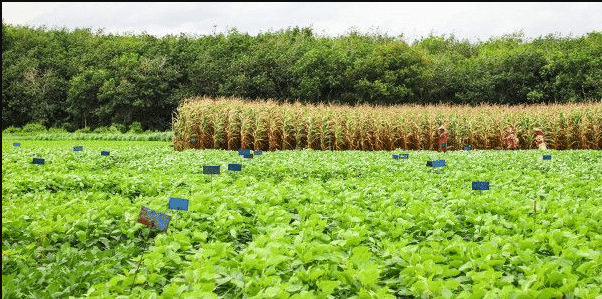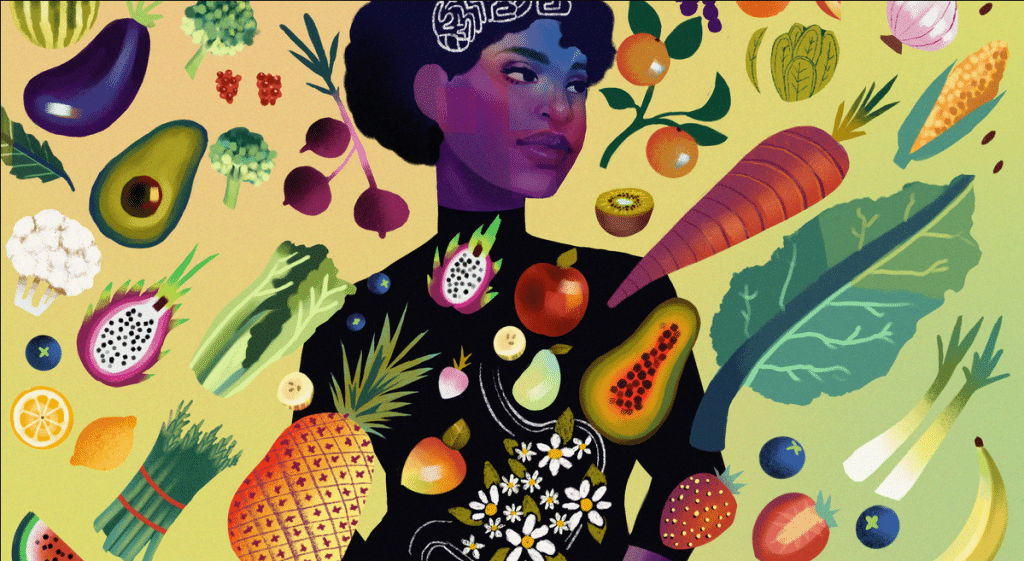As our world becomes more conscious of the environmental impacts of our choices, plant-based diets are becoming increasingly popular. Vegetarianism and plant-based diets are not only good for the environment but also offer numerous health benefits.
Plant-based diets have been shown to lower blood pressure, reduce the risk of heart disease and type 2 diabetes, and even lower the risk of cancer. As such, it’s no surprise that more people are turning to vegetarianism and plant-based diets as a way to maintain a healthier lifestyle.
The future of food is likely to be shaped by this trend towards plant-based diets. Firstly, the demand for meat alternatives is skyrocketing, leading to the development of new plant-based products that mimic the taste and texture of meat. Consequently, vegan and vegetarian options are now available at almost every fast-food chain and restaurant across the globe.
Furthermore, as we become more aware of the environmental impact of animal agriculture, many consumers are making more conscious choices about their food consumption. This has led to an increased focus on sustainable farming practices and the use of renewable resources in food production.
Another shift in the industry is the rise of vertical farming, which involves growing crops in stacked layers using artificial light and controlled environments. This technique allows farmers to produce more crops in a smaller space and with fewer resources, making it a more sustainable option for feeding our growing population.

In conclusion, the future of food is being shaped by the increasing popularity of vegetarianism and plant-based diets. The shift towards sustainable farming practices, the development of meat alternatives, and the rise of vertical farming are just a few examples of how this trend is impacting the food industry. As more people embrace plant-based diets, we can expect to see even more innovations in food production and a continued effort towards creating a healthier and more sustainable food system.
Health Benefits and Risks of a Vegetarian Diet
Vegetarianism has become increasingly popular in recent years as people become more aware of the health benefits and environmental impact of their food choices. A vegetarian diet, which is primarily based on plant-based foods such as fruits, vegetables, grains, legumes, nuts, and seeds, has been associated with numerous health benefits.
One of the main health benefits of a vegetarian diet is improved heart health. Studies have shown that vegetarians tend to have lower blood pressure, cholesterol levels, and a reduced risk of heart disease compared to their meat-eating counterparts. This may be due to the fact that plant-based diets are typically low in saturated fats and high in fiber, vitamins, minerals, and antioxidants that can support overall cardiovascular health.
Vegetarianism has also been linked to a reduced risk of certain types of cancer. Several studies suggest that a diet rich in fruits, vegetables, and whole grains can help protect against cancers of the colon, breast, prostate, and lung. Additionally, consuming fewer processed meats and red meats may reduce the risk of colorectal cancer.
However, it’s important to note that there are some potential risks associated with a vegetarian diet, especially if it’s not properly planned. Without adequate planning, a vegetarian diet may be lacking in certain essential nutrients such as protein, iron, calcium, and vitamin B12. It’s important for vegetarians to ensure they are getting enough of these nutrients through plant-based sources or supplements.
Moreover, not all vegetarian diets are created equal. Some vegetarian diets may include excessive amounts of highly processed foods, refined carbohydrates, and added sugars, which can negatively impact health. It’s important to focus on whole, nutrient-dense plant-based foods while avoiding heavily processed vegetarian options.
In conclusion, a well-planned vegetarian diet can provide numerous health benefits, including improved heart health and a reduced risk of certain types of cancer. However, it’s crucial to pay attention to nutrient intake and avoid highly processed vegetarian options to ensure optimal health outcomes.
Changing Attitudes Towards Animal Welfare
In recent years, there has been a significant increase in public awareness and concern about animal welfare. This shift in attitude can be attributed to various factors, including the increase in social media usage and the growing popularity of documentaries that shed light on animal abuse and exploitation.
One of the main drivers of this change is the increased access to information about the treatment of animals in various industries, such as factory farming and animal testing. As consumers become more informed about the practices of these industries, many are choosing to support companies that prioritize animal welfare or even opting for plant-based diets. In turn, this has led to businesses and governments taking steps towards implementing more humane policies.
Additionally, the rise of social media has given a platform for animal rights activists to raise awareness and advocate for animal welfare issues. Through viral campaigns and videos, the public has been exposed to the realities of animal cruelty and encouraged to take action.
Another factor that has contributed to the changing attitudes towards animal welfare is the emotional connection that people have with their pets. Many pet owners consider their furry friends to be members of their family and are therefore more likely to empathize with other animals and want to protect them from harm.
Despite the progress made, there is still much work to be done in the realm of animal welfare. The use of animals for entertainment purposes, such as circuses and bullfighting, remains prevalent in many parts of the world. Moreover, many countries still have lax animal welfare laws that fail to protect animals from abuses like neglect and abandonment.
In conclusion, the changing attitudes towards animal welfare have been crucial in pushing for better treatment and protections for animals. The increasing awareness and concern for animal welfare have resulted in positive changes in policies and practices across various industries. However, there is still much to be done, and it is essential for all of us to continue advocating for the ethical treatment of animals.
Innovations in Sustainable Agriculture
Agriculture has come a long way since the first time humans planted crops over 10,000 years ago. Today, we have advanced technologies, innovative ideas, and modern techniques that have transformed the way we farm. One of the most crucial advancements in agriculture is the emphasis on sustainability. Sustainable farming practices aim to meet the demands of the present without compromising the ability of future generations to meet their own needs.
Innovations in sustainable agriculture are revolutionizing the way we produce food and fiber while preserving natural resources and ecosystems. One such innovation is precision agriculture, which uses technology to help farmers manage their fields more efficiently. With precision agriculture, farmers can use data-driven insights to optimize inputs, reduce waste, and maximize yields. For instance, drones equipped with sensors can monitor crop health, soil moisture levels, and other key parameters, enabling farmers to make informed decisions about irrigation, fertilization, and pest control.
Another promising innovation in sustainable agriculture is vertical farming, which involves growing crops in vertically stacked layers instead of traditional horizontal fields. Vertical farms use hydroponic or aeroponic systems to grow plants without soil, using substantially less water and nutrients than conventional farming. This method of farming also eliminates the need for pesticides, reduces transportation costs, and allows year-round production, making it an ideal solution for urban areas with limited space.
Sustainable agriculture innovations also include regenerative farming, which focuses on restoring soil health and biodiversity through practices like cover cropping, crop rotation, and reduced tillage. Regenerative farming helps build soil organic matter, sequester carbon, and improve water quality, benefiting both the environment and the farmer’s bottom line.

In conclusion, innovations in sustainable agriculture are essential to ensure that we can feed a growing population while protecting our planet’s natural resources and ecosystems. By adopting these innovative practices, farmers can increase their yields, reduce their environmental impact, and contribute to a more sustainable future for all.
The Ethics of Food Production and Consumption
Food is one of the most basic human needs, yet the way we produce and consume it has significant ethical implications. The Ethics of Food Production and Consumption is a topic that deserves our attention as consumers, producers, and policymakers.
Firstly, let’s look at food production. There are many ethical issues involved in producing food, such as animal welfare, environmental impact, and labor practices. For example, factory farming has been criticized for its inhumane treatment of animals, while monoculture agriculture can contribute to soil depletion and deforestation. As consumers, it’s important to consider not only the nutritional value of the food we eat but also how it was produced.
On the other hand, food consumption also raises ethical questions. One major issue is food waste, which is not only an ethical concern but also an environmental problem. In developed countries, around one-third of all food produced is wasted, while millions of people around the world suffer from hunger. Additionally, the meat industry is a significant contributor to greenhouse gas emissions, which contribute to climate change. Therefore, reducing meat consumption can also be seen as an ethical choice for those concerned about the environment.
Furthermore, ethical considerations extend beyond just the production and consumption of food. Food access and distribution are also important issues, particularly for marginalized communities who may lack access to affordable, healthy food options. In light of this, policymakers must work to promote equitable access to nutritious food for all individuals.
In conclusion, the Ethics of Food Production and Consumption is a complex topic with many different dimensions. As consumers, we have the power to make ethical choices by supporting sustainable and humane farming practices, reducing food waste, and choosing plant-based or ethically-raised animal products. It’s up to us to ensure that we’re making choices that align with our values and support a healthier, more sustainable food system for everyone.
The Cultural Significance of Plant-Based Diets
Plant-based diets have been gaining popularity in recent years, not only for their potential health benefits but also for their cultural significance. In many cultures around the world, plant-based diets have long been a staple of daily life and hold important symbolic meaning.
In Hinduism, for example, vegetarianism is often practiced as a way to show compassion and nonviolence towards all living beings. Similarly, Buddhism also places emphasis on compassion and advocates for a vegetarian or vegan diet as a way to practice mindfulness and reduce suffering.
In addition to spiritual significance, plant-based diets have played an important role in cultural celebrations and traditions. In Mexico, for instance, the Day of the Dead festivities include offering up traditional plant-based dishes such as tamales de frijol (bean tamales) and chiles rellenos de queso (stuffed peppers with cheese).
Plant-based diets also have roots in African American cuisine, where dishes like collard greens, black-eyed peas, and sweet potato pie have been passed down through generations. These foods not only reflect the history and traditions of African American culture but also provide nourishment and sustenance.
Beyond cultural significance, plant-based diets have also gained attention for their potential to address environmental concerns. The agriculture industry is a significant contributor to greenhouse gas emissions and deforestation, and transitioning to plant-based diets can help reduce our carbon footprint and preserve natural resources.

Overall, the cultural significance of plant-based diets extends far beyond nutrition and health. From religious practices to traditional celebrations, plant-based diets hold important symbolic meaning in many cultures worldwide. As we continue to explore the benefits of plant-based diets, it’s important to recognize and appreciate their cultural significance and the role they play in shaping our world.
The Future of Food: A Shift Towards Vegetarianism?
As people become more health-conscious and environmentally aware, there has been a growing trend towards vegetarianism. With the increasing availability of plant-based products and better understanding of the benefits of a plant-based diet, many individuals are opting for a meat-free lifestyle. But what does this shift towards vegetarianism mean for the future of food?
One thing is clear: the demand for plant-based products is only going to increase. Major food companies have recognized this trend and are investing heavily in developing and marketing their plant-based offerings. Beyond Meat and Impossible Foods are two examples of companies that have seen tremendous success with their plant-based burgers, which mimic the taste and texture of meat.
In addition to plant-based alternatives to meat, there has also been a surge in interest in locally sourced and organic produce. Consumers are becoming more conscious of where their food comes from and the environmental impact of its production. This has led to an increase in urban farming initiatives and community-supported agriculture (CSA) programs, where consumers can purchase shares in local farms and receive a regular supply of fresh, seasonal produce.
The shift towards vegetarianism is not just limited to individuals. Governments and organizations around the world are recognizing the benefits of plant-based diets and are taking steps to promote them. For example, in 2019, the city of New York implemented “Meatless Mondays” in public schools, where all meals served on Mondays are vegetarian. The United Nations has also recognized the importance of plant-based diets for sustainability and health, encouraging a shift towards more plant-based diets in their sustainable development goals.
However, it’s important to note that vegetarianism is not a one-size-fits-all solution. Some individuals may need to consume animal products for health reasons, and others may choose to include small amounts of meat or fish in their diet. The key is to make informed choices and be mindful of the impact our food choices have on our health and the environment.
In conclusion, while it’s too early to predict the future of food with certainty, the shift towards vegetarianism is a trend that is likely to continue. As consumers become more health-conscious and environmentally aware, they will demand more plant-based options and locally sourced produce. Governments and organizations will also play a role in promoting plant-based diets for sustainability and health. By making informed choices about our food, we can create a healthier and more sustainable future for ourselves and our planet.
You can check this website about “Vegetarian and Vegan Eating“. It can be so helpful for general knowledge about this topic.





























Leave a Reply